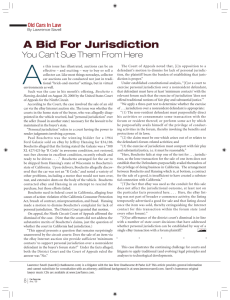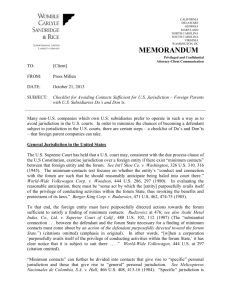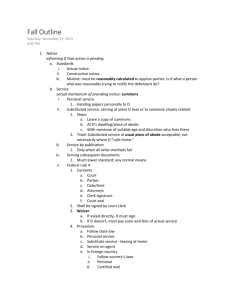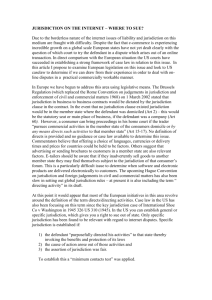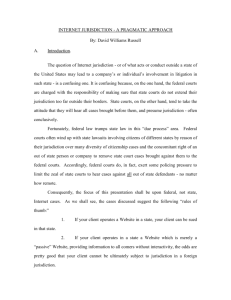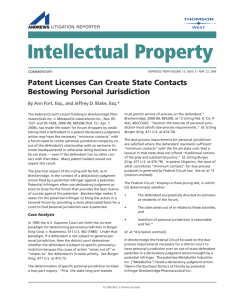Civil Procedure Outline
advertisement
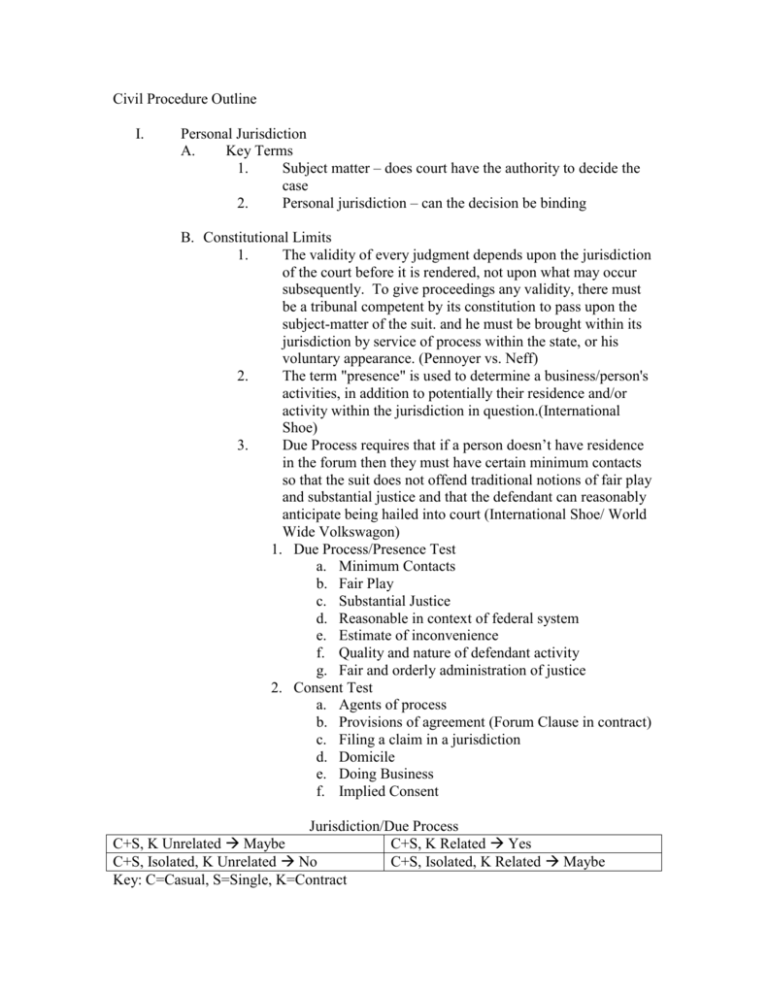
Civil Procedure Outline I. Personal Jurisdiction A. Key Terms 1. Subject matter – does court have the authority to decide the case 2. Personal jurisdiction – can the decision be binding B. Constitutional Limits 1. The validity of every judgment depends upon the jurisdiction of the court before it is rendered, not upon what may occur subsequently. To give proceedings any validity, there must be a tribunal competent by its constitution to pass upon the subject-matter of the suit. and he must be brought within its jurisdiction by service of process within the state, or his voluntary appearance. (Pennoyer vs. Neff) 2. The term "presence" is used to determine a business/person's activities, in addition to potentially their residence and/or activity within the jurisdiction in question.(International Shoe) 3. Due Process requires that if a person doesn’t have residence in the forum then they must have certain minimum contacts so that the suit does not offend traditional notions of fair play and substantial justice and that the defendant can reasonably anticipate being hailed into court (International Shoe/ World Wide Volkswagon) 1. Due Process/Presence Test a. Minimum Contacts b. Fair Play c. Substantial Justice d. Reasonable in context of federal system e. Estimate of inconvenience f. Quality and nature of defendant activity g. Fair and orderly administration of justice 2. Consent Test a. Agents of process b. Provisions of agreement (Forum Clause in contract) c. Filing a claim in a jurisdiction d. Domicile e. Doing Business f. Implied Consent Jurisdiction/Due Process C+S, K Unrelated Maybe C+S, K Related Yes C+S, Isolated, K Unrelated No C+S, Isolated, K Related Maybe Key: C=Casual, S=Single, K=Contract 4. 5. 6. 7. 8. 9. 10. 11. The unilateral act of one party does not subject the other party to jurisdiction in the first party’s forum. Both bilateral acts may. (McGee Hanson, and Gray) If a person or company benefits from the laws either directly or indirectly, then the court has a strong case to say there is jurisdiction. If minimum contacts are a yes it is heavier then substantial justice and fair play no. a. Zippo sliding scale of website interactivity b. Calder effect test (web sites) i. Site to be directed at forum ii. Expressly open activity iii. Structuring website to appeal to those in forum iv. Talk and solicit customers about how your product is advantageous to the forum If a defendant purposefully avails themselves, then the court most likely has jurisdiction. a. Design for forum b. defamation with story about x may have x jurisdiction c. reasonably anticipate being hailed into forum d. predictability/preparation for defendant Agent of service, consent, waiving jurisdiction, incorporated, or domiciled in the forum will most likely give the courts jurisdiction. Justice Brennan believes that very strong fair play and substantial justice can bolster weak minimum contacts. Contact within forum can help grant jurisdiction a. Not unilateral b. Purposefully availed c. Activities within forum d. Benefits and protections of forums laws (directly or indirectly) Stream of commerce – if your product regularly enters into a stream of commerce you are more likely to be subject to jurisdiction. a. This goes along with being purposefully availed through design and such (see note 7above) b. Foreseeability - at a medium to high level so a vendor who seeks to serve a forum is different then a product that traveled there by chance c. Advertisements, Advice communications about a product (hotlines etc.), marketing, and etc. in the 12. II. forum will more then likely subject you to jurisdiction. Asahi Three Opinions a. No minimum contacts without intent or purpose to serve a forum (not precedent, but good dicta) b. If vendor knew product would end up in forum, he benefited from laws there and is more then likely subject to jurisdiction c. Component part vs. whole product – component parts won’t likely be subject to jurisdiction i. Volume ii. Value iii. Hazardous nature Notice and Opportunity to be Heard A. Notice 1. An elementary and fundamental requirement of due process in any proceeding which is to be accorded finality is notice reasonably calculated under all circumstance to apprise interested parties of the pendency of the action and afford them the opportunity to present their objections. (Mulhane) a. This doesn’t mean every person has to be reached when people are unknown, but steps have to be taken that are reasonable and efficient to attempt to give everyone notice, for example mailing is for the most art okay while an ad in the paper is not. 2. You can leave summons with competent person at residence 3. Society is highly mobile so traditional dwelling places or abodes are different a. Permanence b. Remodeling c. Use on other governmental forms 4. Presence at one abode on day of service will aid notice requirements 5.
